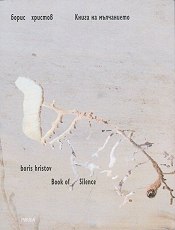Книга на мълчанието
пролог
Какво говори философът?
Не е ли същото, което аз живея –
но без думи?
1.
Навсякъде в небето примки и капани –
богослужебни знаци, псалми и бръмчене.
Навсякъде край нас спасителни камбани…
И ни една душа спасена.
2.
Разхвърляно до хоризонта Време –
да ровим в него и с усърдието на клошари
да го събираме на мънички купчини,
които вятарат безмилостен отвява.
3.
Оставени сме тук обърнати по гръб да драскаме
въпроси по небето и да си отговаряме сами –
докато някой ден Безкраят се смили
и подаде ръка да ни изправи.
4.
Загърната в парцали от мъгли къде отива
сляпата тълпа, която се представя за човечество?…
Следи наоколо от хиляди посоки –
и ни следа от Пътя.
…..
___________________________________________________________________________
Book of Silence
Prologue
What does the philosopher say?
Is it not the same as what I am living –
but without words?
1.
Everywhere in the sky snares and wiles –
liturgical signs, psalms and buzzing.
Everywhere beside us, saving bells…
And not a single soul saved.
2.
Time, scattered to the horizon –
to search in it and with the zeal of a vagrant
to gather it up in tiny heaps,
which the wind unmercifully blows away.
3.
We are left here, turned to our backs, to scratch
questions on the sky and to answer them alone,
until one day Eternity deigns to stretch out a hand
and stands us upright.
4.
Wrapped up in shreds of fog, where does the blind
mob go, which passes itself off as humanity?…
All around – tracks from a thousand directions,
but not one track from the Road.
…..
__________________________________________________________________________
Buch der Stille
Prolog
Was sagt der philosoph?
Ist es nicht dasselbe, was ich lebe –
nur ohne worte?
1.
Überall am himmel stricke und netze –
liturgische zeichen, psalmen und summen.
Überall um uns herum rettungsglocken…
Und nicht eine einzige seele gerettet.
2.
Die zeit, verstreut am horizont –
in ihr suchend und mit dem eifer der landstreicher
sie in winzigen haufen sammelnd,
die der wind unbarmherzig verweht.
3.
Zurückgelassen sind wir auf dem rücken liegend um
fragen in den himmel zu kratzen und sie uns selbst zu beantworten –
bis eines tages die Unendlichkeit sich unserer erbarmt
und uns die hand nach oben reicht.
4.
Eingehüllt in fetzen aus nebel, wohin geht
der blinde mob, der sich selbst als menschheit ausgibt?…
umgeben von spuren aus tausenden richtungen
aber nicht eine spur vom Weg.
…..
from: Boris Hristov: Book of Silence (Kniga za malchanieto), bi-lingual edition Bulgarian-English, transl. by John Hamilton, Riva, Sofia 2014 – Boris Christov: Buch der Stille
German translation: Thomas Hübner
© Boris Hristov and Издателство Riva, 2014. © Thomas Hübner and mytwostotinki.com, 2014-5. Unauthorized use and/or duplication of this material without expressed and written permission from this blog’s author and/or owner is strictly prohibited. Excerpts and links may be used, provided that full and clear credit is given to Thomas Hübner and mytwostotinki.com with appropriate and specific direction to the original content.




 Facebook
Facebook RSS
RSS Twitter
Twitter
My German is only just good enough to read your version with help from the English – and my Russian non-existent. But it’s a fascinating exercise to do, isn’t it? I’ve worked on French poems and also on some Ghazals of Ghalib via a literal prose translation. I think it makes you much sharper about the use of your own language, and much more aware of the unsayable in any language!
I agree, translating is an excellent exercise that makes you more aware and sensitive regarding the language. As a translator you have to make all the time decisions, which makes it a challenging task. But it is also very rewarding!